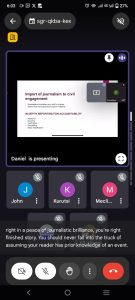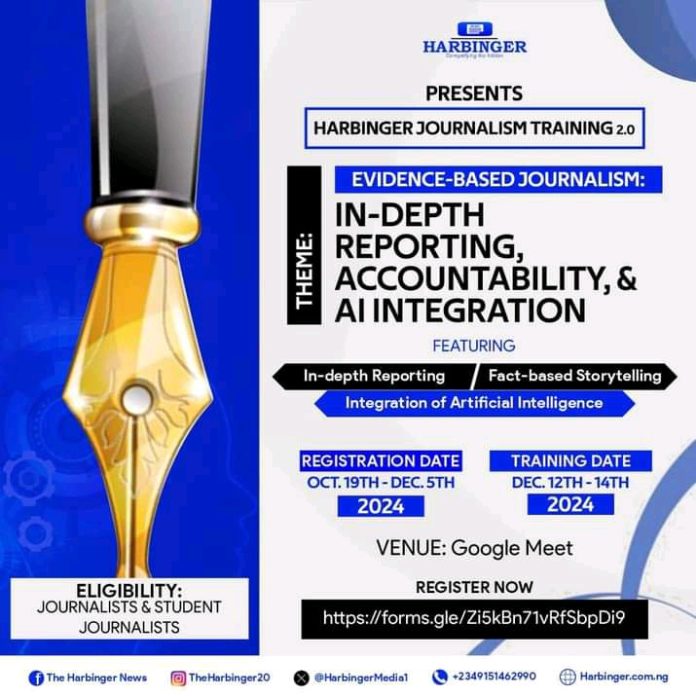By Ismaila Biliaminu Manne and Adesina Quadri Ademola
Amid growing concerns about media transformation, AI-generated content, press release reporting, and the spread of misinformation, The Harbinger outlet organized a training session on December 12 and 13, 2024 via Google Meet to redefine media reportage and promote accountability journalism.
The training, which is the second phase of the Harbinger Journalism Training series, was themed “Evidence-Based Journalism: In-Depth Reporting, Accountability Journalism, and AI Integration,” featured two facilitators and aimed to enlighten both professional and campus journalists on producing accountability-driven stories rather than relying on press releases.
The first phase of the training, held the previous year, focused on empowering aspiring journalists with the fundamentals of news reporting, feature writing techniques, and the art of crafting special reports: lauding the Harbinger as not just merely an online platform that publishes news, entertainment analysis, investigative reports, grassroots stories, and coverage of crime and social injustice.
It also serves as an educational hub, equipping professional and aspiring journalists, with essential skills to challenge the status quo and drive grassroots development.
Speaking about the rationale behind the training, Boluwatife Adedokun, the Publisher of Harbinger News, said, “The goal is to educate participants on the need for more accountability stories. I’ve noticed that many journalists, even those in mainstream media, focus on press releases. We need to change the narrative and hold the government accountable through evidence-based journalism, backed by data. That is why training like this is essential.”
The Training?
The training provided a platform for participants to enhance their skills and gain new insights.
“The training was an excellent platform to further sharpen my skills as a campus journalist, and it has inspired me to aim higher in journalism,” said Mutalib Jubril, a 300-level Pharmacy student at Usmanu Danfodiyo University, Sokoto, and a campus journalist.
The Publisher revealed that renowned resource persons, Daniel Ojukwu, an investigative journalist with the Foundation for Investigative Journalism (FIJ), and Kehinde Ogunyale, a Data journalist with Dataphyte, were invited to facilitate the training.
“The focus was on evidence-based journalism, data journalism, and AI integration.
“We invited experienced journalists versed in these areas, and they did justice to the training’s theme,” Boluwatife said.
The first session, led by Daniel Ojukwu, emphasized the importance of in-depth reporting to hold individuals and organizations accountable.

The second session highlighted the role of data in evidence-based reporting. Daniel described journalism as a vital mirror of society, shedding light on pressing issues and prompting action.
During his session, Daniel addressed misconceptions about journalism, stating that half-truths, fake news, and misleading information do not align with the profession. He stressed the importance of thorough verification before disseminating information.
Daniel also discussed the integration of artificial intelligence (AI) in journalism.
He explained that while AI can simplify some aspects of a journalist’s work, it should not replace their effort. Instead, he urged participants to use AI as a complementary tool while remaining actively involved in their reporting.
Sarah Onesmo, a journalist from Mwanza, Tanzania, noted the training’s emphasis on confidence-building, creativity, and collaboration. She highlighted how group activities fostered trust and encouraged participants to present their ideas confidently.
“Harbinger’s training has brought new light to learning methods and the importance of collaboration. It’s crucial to explore how these methods can enhance learning and create an environment of confidence among participants,” Sarah concluded.
“Participants Learned A Lot”
Further speaking with Boluwatife Adedokun, the Publisher of Harbinger who is the organizer of the training shared the overwhelming positive feedback from participants.
“Participants learned a lot and left with valuable lessons, ranging from experienced journalists to aspiring ones. Both sessions were highly interactive and engaging. I’m thrilled everyone was happy to be part of the training,” Boluwatife said.
She highlighted the growing role of artificial intelligence (AI) in journalism, addressing misconceptions among journalists.
“AI is the new trend across industries, including journalism. Some people, even journalists, think AI will make journalists lazy or replace them, while others don’t use it at all. However, there’s a way to integrate AI without compromising professional ethics. The training shed light on this, demystifying how AI can be used effectively by professional journalists, leaving the participants with the fulfillment to explore,” Boluwatife added.
Participants Highlight Significant Takeaways, Commend Training Program
Participants expressed their excitement and gratitude for the impactful sessions, citing significant takeaways from the training.
Mutalib Jubril, a campus journalist and 300-level Pharmacy student at Usmanu Danfodiyo University, Sokoto, commended the initiative: “The training was truly rewarding,” Mutalib said.
“But the experience went beyond what I imagined. I had the opportunity to delve into the essentials of in-depth reporting for accountability and explore the critical role of journalism in ensuring civic engagement,” he added.
Similarly, David Olatunji, a campus journalist and Editor-in-Chief of The Academia Campus Journalists at the University of Ibadan, Abeokuta Affiliate Campus, praised the program as “amazing.”
“Through the first session with Daniel Ojukwu, I was motivated to make use of my ‘why’ more than anything as a journalist, and I believe it will help me in the course of delving into in-depth reporting in my subsequent work,” David shared.
“I must confess, it gave me the consciousness of the need to do better as a campus journalist who’s into writing investigative stories and holding power accountable on campus,” he added.
Shamsudeen Abubakar, another participant and prospective journalist, also expressed his appreciation: “I was inspired by the skills and knowledge shared by the two tutors, Mr. Daniel and Mr. Kehinde. I’m really happy with the training and determined to improve,” he said.
He further emphasized the practical takeaways: “The training was an inspiration to me and a kind of lifeguard that’s going to save me from the errors I used to make, specifically in getting my data. I can now boast that I am good.”
Shamsudeen noted key lessons, such as not using AI as an editor, sourcing data responsibly, and reading similar stories before starting his own work.




